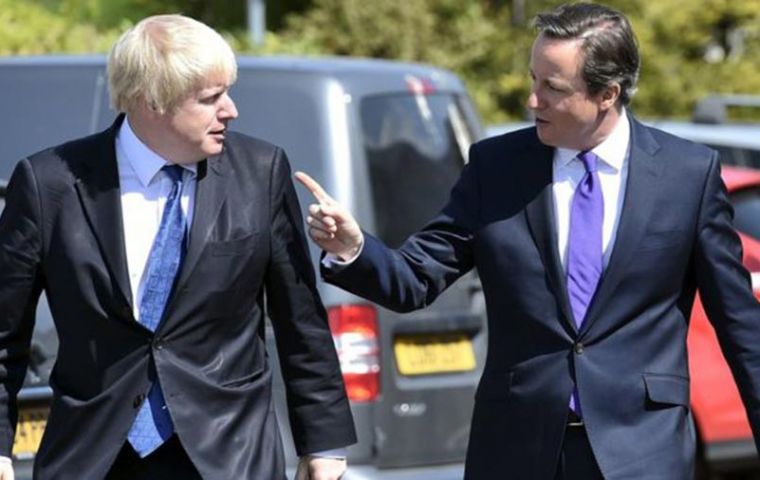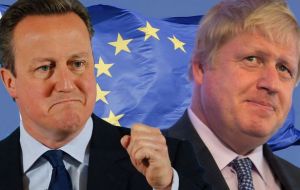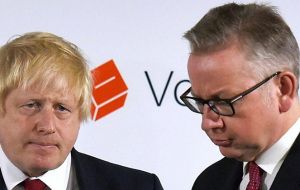MercoPress. South Atlantic News Agency
Cameron accuses Johnson of backing Brexit for the sole purpose of advancing his political career
 Cameron said Johnson believed that campaigning for UK to leave the EU during the 2016 referendum would make him the “darling” of their Conservative party (Pic BBC)
Cameron said Johnson believed that campaigning for UK to leave the EU during the 2016 referendum would make him the “darling” of their Conservative party (Pic BBC)  In extracts published in the Sunday Times, Cameron, who led the failed “Remain” campaign to stay in the EU - also accused his “Leave” rivals of lying to the public
In extracts published in the Sunday Times, Cameron, who led the failed “Remain” campaign to stay in the EU - also accused his “Leave” rivals of lying to the public  Cameron wrote that Johnson and Michael Gove, “became ambassadors for the expert-trashing, truth-twisting age of populism” during the campaign.
Cameron wrote that Johnson and Michael Gove, “became ambassadors for the expert-trashing, truth-twisting age of populism” during the campaign. Former British prime minister David Cameron launched a blistering attack on the UK's current leader Boris Johnson in extracts of his memoirs published on Sunday, accusing him of only backing Brexit to further his own career.
He said Johnson, who took office in July, believed that campaigning for Britain to leave the European Union during the 2016 referendum would make him the “darling” of their Conservative party.
Damningly, he also said that Johnson privately believed there should be a second referendum to confirm the terms of Brexit - something the premier has strongly resisted since.
In extracts published in the Sunday Times, Cameron - who led the failed “Remain” campaign to stay in the EU - also accused his “Leave” rivals of lying to the public.
He wrote that Johnson and one of his top ministers Michael Gove - a former close friend of Cameron's - “became ambassadors for the expert-trashing, truth-twisting age of populism” during the campaign.
Cameron, 52, has largely kept out of the public eye since stepping down in the wake of the historic Brexit vote.
But the publication of his memoirs comes at an explosive time, with Britain mired in political turmoil ahead of its scheduled exit from the bloc on Oct 31.
Johnson is desperately seeking a divorce deal from Brussels but insists Britain will leave without one if necessary - even after parliament blocked a “no deal” exit.
Cameron revealed he had tried to stop Johnson from joining the Brexit campaign by offering him the post of defense secretary.
But he went ahead, and “risked an outcome he didn't believe in because it would help his political career”.
He claimed Johnson believed the “Leave” camp would lose, and if it won “there could always be a fresh renegotiation, followed by a second referendum” - something he now rejects.
Meanwhile, “whichever senior Tory politician took the lead on the Brexit side -- so loaded with images of patriotism, independence and romance - would become the darling of the party,” Cameron wrote.
During the campaign, he said Johnson and Gove “behaved appallingly, attacking their own government, turning a blind eye to their side's unpleasant actions and becoming ambassadors for the expert-trashing, truth-twisting age of populism”.
Cameron condemned claims made by the “Leave” campaign of the savings Britain would make by ending its EU membership fees, and of the likelihood of Turkey joining the bloc.
“We were no longer in the realms of stretching the truth, but ditching it altogether. Leave was lying,” he wrote.
He said Gove became a “foam-flecked Faragist warning that the entire Turkish population was about to come to Britain”, a reference to eurosceptic politician Nigel Farage.
Cameron said that as prime minister, he felt he could not hit back as hard, resulting in “asymmetric warfare”.
In previous extracts of his long-awaited memoir, “For The Record”, which is published on Thursday, Cameron said he had no regrets on calling the referendum.
But he said he was “desperately” worried about what happens next - and said the tortuous negotiations had been “painful to watch”.
His immediate successor as premier, Theresa May, negotiated exit terms with Brussels last year, but parliament rejected these three times, forcing her to quit.
Johnson took over, vowing to get Brexit done, but he has also struggled as EU leaders warned they will not renegotiate, and with parliament still deeply divided over how to proceed.
On Monday, he will meet European Commission chief Jean-Claude Juncker and Brexit negotiator Michel Barnier in Luxembourg.
In an interview with the Mail on Sunday, Johnson said his team was making a “huge amount of progress” in the talks and he was “very confident” he could get a deal before a summit of EU leaders on Oct 17.




Top Comments
Disclaimer & comment rules-

Read all commentsThe question is why is this piece appearing in Mercopenguin, a British government propaganda organ supposedly devoted to America, South America and the “South Atlantic”?
Sep 25th, 2019 - 05:00 am 0Commenting for this story is now closed.
If you have a Facebook account, become a fan and comment on our Facebook Page!